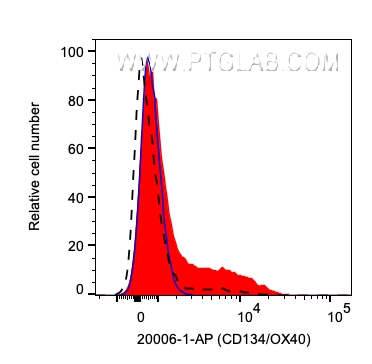验证数据展示
经过测试的应用
| Positive WB detected in | MJ cells |
| Positive FC detected in | PHA treated human PBMCs |
推荐稀释比
| Application | Dilution |
|---|---|
| Western Blot (WB) | WB : 1:500-1:2000 |
| Flow Cytometry (FC) | FC : 0.20 ug per 10^6 cells in a 100 µl suspension |
| It is recommended that this reagent should be titrated in each testing system to obtain optimal results. | |
| Sample-dependent, Check data in validation data gallery. | |
发表文章中的应用
| WB | See 2 publications below |
产品信息
20006-1-AP targets CD134/OX40 in WB, FC, ELISA applications and shows reactivity with human samples.
| Tested Applications | WB, FC, ELISA Application Description |
| Cited Applications | WB |
| Tested Reactivity | human |
| Cited Reactivity | human |
| Immunogen | Peptide 种属同源性预测 |
| Host / Isotype | Rabbit / IgG |
| Class | Polyclonal |
| Type | Antibody |
| Full Name | tumor necrosis factor receptor superfamily, member 4 |
| Synonyms | TNFRSF4, TXGP1L, ACT35, ACT35 antigen, CD134, OX40, OX40L receptor, TAX transcriptionally-activated glycoprotein 1 receptor |
| Calculated Molecular Weight | 29 kDa |
| Observed Molecular Weight | 50-55 kDa, 40 kDa |
| GenBank Accession Number | NM_003327 |
| Gene Symbol | CD134 |
| Gene ID (NCBI) | 7293 |
| RRID | AB_10733472 |
| Conjugate | Unconjugated |
| Form | Liquid |
| Purification Method | Antigen affinity purification |
| UNIPROT ID | P43489 |
| Storage Buffer | PBS with 0.02% sodium azide and 50% glycerol pH 7.3. |
| Storage Conditions | Store at -20°C. Stable for one year after shipment. Aliquoting is unnecessary for -20oC storage. |
背景介绍
CD134 (OX40) is a member of the TNFR-superfamily of receptors. Predominantly expressed on activated T cells, CD134 is activated by its cognate ligand CD134L (OX40L) and functions as a T cell co-stimulatory molecule. CD134-CD134L interactions have been proposed as a potential therapeutic target for treating autoimmunity (PMID: 26215166). CD134 can interact with TRAF2, TRAF3, and TRAF5.
实验方案
| Product Specific Protocols | |
|---|---|
| WB protocol for CD134/OX40 antibody 20006-1-AP | Download protocol |
| FC protocol for CD134/OX40 antibody 20006-1-AP | Download protocol |
| Standard Protocols | |
|---|---|
| Click here to view our Standard Protocols |
发表文章
| Species | Application | Title |
|---|---|---|
Front Immunol A Novel Immune-Related Gene Signature to Identify the Tumor Microenvironment and Prognose Disease Among Patients With Oral Squamous Cell Carcinoma Patients Using ssGSEA: A Bioinformatics and Biological Validation Study | ||
Dis Markers Development of a Costimulatory Molecule Signature to Predict Prognosis, Immune Landscape, and Response to Immune Therapy for Hepatocellular Carcinoma |

